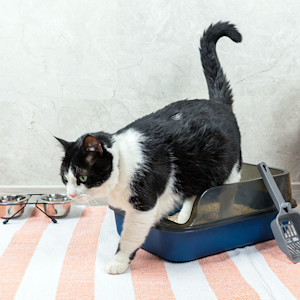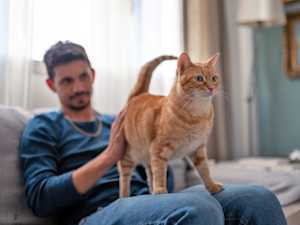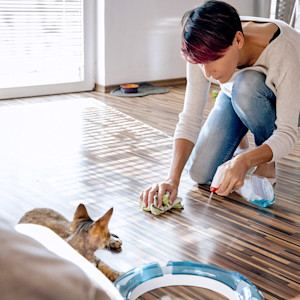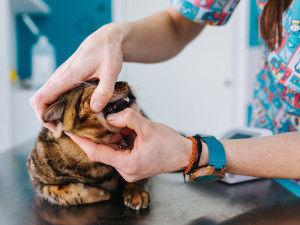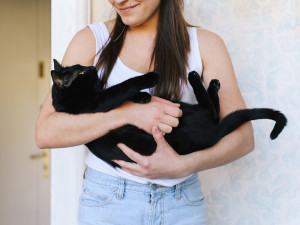Why Does Your Cat Smell Bad?
You love them, but oooh, boy, that is unpleasant.

Share Article
In The Archive:
Why Is My Cat So Smelly? Why Does My Cat’s Breath Smell So Bad? Cat Ear Odor Why Does My Cat’s Poop Smell So Bad? Bad Cat Smell (Skin or Coat)
Nothing beats a close snuggle with your kitty, especially when they get their purr on, but when you get cozy only to discover your cat has a funky smell, you may be less than thrilled. There are many reasons your cat may develop a stench from head-to-toe beans so you’ll have to do some investigating to find the source. If you do find something that doesn’t seem right, be sure to consult your vet right away.
Read on to learn more about the possible causes for your cat’s funk.

Why is my cat so smelly?
If your cat suddenly develops a pungent odor, it’s important to take note; this can be a sign of a medical problem. Depending on your cat’s temperament and your level of squeamishness, you may be able to give your cat a thorough once-over to find the source of the smell. For cats who are not tolerant of a lot of handling or pet parents who just don’t want to go there, it may be better to seek veterinary help to identify the source of the smell.
Some common causes of a bad odor in cats include dental problems, bacterial infections in the ears or on the skin, or digestive problems. If you can’t find the source of the smell and it seems to be persistent, be sure to see a vet for help finding the source and treating the underlying problem. Treatments will vary quite a bit based on the specific diagnosis, so you’ll want to be sure you are targeting the right condition.
Why does my cat’s breath smell so bad?
Let’s face it: cat’s don’t exactly have sweet-smelling breath under the best circumstances, but if there is a problem in their mouth, you’ll definitely notice that their breath starts to smell worse. Their breath may even have an odor you can detect at a distance. Some of the common reasons for bad breath in cats include:
Dental disease: The most likely cause of a bad smell in your cat’s mouth is dental disease. Most cats do not get their teeth brushed regularly, so over time, they are at a higher risk of problems, like gingivitis and tooth decay. Some cats also develop specific conditions like stomatitis and resorptive lesions on their teeth. In addition to bad breath, cats with dental disease are often painful and may show other signs like difficulty eating, loss of appetite, weight loss, pawing at their mouth, drooling, or not grooming themselves as much. Any of these signs warrant a check up with a veterinarian.
Growths, ulcers, and wounds: Cats can develop other conditions in their mouth that may be accompanied by a bad smell. Ulcers are wounds that form on their tongue or gums and are very painful and often associated with diseases like respiratory infections, kidney disease, or chemical burns. Cats can also develop wounds in their mouth from injuries like chewing on sharp objects, strings, or other trauma to their mouth. Tumors of the mouth are another possible cause for a bad smell. Often, these growths can result in secondary infections which produce a bad odor.
Kidney disease: Cats with advanced kidney disease may have a distinct type of bad breath known as uremic breath. As the kidneys become less functional, toxins like urea build up in the body and can affect their breath, as well as causing painful ulcers in their mouth.
Cat ear odor
Infections of any kind often create a bad odor as many organisms release foul-smelling byproducts. The ears can be a source of bacterial or yeast infections for some cats, so if you are looking for the source of your cat’s bad odor, be sure to check their ears too.
Cats with ear infections often have other signs including shaking their head frequently, scratching at their ears, or holding their ears or head at a slightly tilted angle. If your cat won’t let you touch their ears, your veterinarian can do a more thorough ear exam using an otoscope and by analyzing a sample of discharge from inside their ear canals. Cats with ear infections need targeted medications that will destroy the specific microbe causing the infection and relieve the pain and itch related to the infection.
Why does my cat’s butt smell so bad?
Cats are carnivores, meaning that they need to eat a diet high in animal-based protein and fat to meet their nutritional needs, but this also means their poop can be especially pungent. Carnivore poop has higher levels of certain waste products, including sulfur compounds, that contribute to its foul odor.
And while cat poop never smells pleasant, there are some factors that may lead your cat’s poop or hind end to smell especially bad. This includes:
Diarrhea: Cats with diarrhea may have especially strong-smelling feces. Unfortunately, when their poop is not well-formed, it is more likely to get stuck to their fur or paws, leading them to track that smell all over the place. There are numerous causes for diarrhea including intestinal parasites, dietary sensitivities, certain medications, chronic conditions like inflammatory bowel disease, and other systemic diseases. Any cat with ongoing diarrhea needs to have a thorough work-up with a veterinarian.
Unkempt fur: Some cats have perfectly healthy poop but for some reason, they are not able to keep their butts clean. Cats are normally meticulous about grooming themselves, but if they can’t reach their butt, they may not be able to keep themselves as clean as they’d like. This often happens in long-haired cats if their fur gets matted around their butt, allowing small bits of poop to become trapped in the fur. It can also happen in overweight cats who are unable to reach their hind end to clean. You can help your cat stay clean back there by keeping the fur around their butt trimmed short, and using a moist paper towel to wipe their butt if they’ll tolerate it.
Anal gland smell: Cats have a set of glands inside the wall of their anus that should empty when they poop. These anal glands contain very strong-smelling liquid that cats use to communicate through scent. Sometimes, when cats are very scared, they will also empty their anal glands and it can have a very strong, fish-like odor. Problems with the anal glands can also contribute to the odor as sometimes these glands become infected or impacted.
Gas: Cats are not typically gassy, but if they’re having digestive issues, they can clear a room as well as any dog. Common causes for flatulence include infections like intestinal parasites, sudden diet changes, or food allergies.
Wounds around the anus: Any open wound can be vulnerable to infection which can lead to a bad odor. Wounds near the anus are especially at risk for contamination from poop, which can make them more likely to become infected. One of the most common wounds to occur near the anus are anal gland abscesses, or infections of the anal gland. These abscesses often rupture, creating an open wound. If your cat is acting especially sensitive around their butt, tucking their tail when they walk, or you see any bleeding, be sure to see a vet.
Bad cat smell (skin or coat)
Cat parents are probably well aware of how fastidious cats are; they are constantly grooming themselves and can’t stand to be dirty. Therefore, it should be a red flag if your cat’s fur or skin develops a bad odor or starts to look unkempt. Some reasons for this include:
Skin infections: Cats can develop skin infections that are localized to one small area of skin, or more generalized to large portions of their skin. These infections are most commonly caused by yeast or bacteria that give off a bad odor. There is usually an inciting cause for the infection such as skin parasites like fleas or mites, allergies, or an injury.
Abscess: Fight wounds are often punctures that lead to infected pockets which fill with pus and abscess. These can cause odor as an abscess and then when they rupture and drain the fluid which has foul odors. Lacerations and other open wounds are always at risk for infection, which often leads to a bad smell. Any time a cat has an open wound, it is important to seek immediate veterinary care to ensure the wound is properly cleaned, closed, or treated with pain medications and antibiotics.
Intact male cat smell: Ok, it may be a stretch to call this a skin condition, but male cats that are not neutered have a very strong body odor. This is due to hormones that impact the smell of scent glands on their body as well as their urine. It is an unmistakable odor that luckily goes away when they are neutered.
Cancer: Cats can develop skin cancers like squamous cell carcinoma and melanoma, as well as other types of cancers that can lead to tumors on or near the skin such as mammary gland tumors and anal gland tumors. If these tumors become infected or necrotic, they can also develop a very bad odor.
Other systemic disease: Problems like dental disease, obesity, arthritis, or anything that makes a cat feel generally unwell can lead them to groom themselves less, creating matted fur or bad odors.
When to go to the vet
If your cat has a persistently bad odor, it is important to see a vet as this may be a sign of an underlying medical problem. Fortunately, or unfortunately, many vets have a lot of experience with the kinds of odors related to medical problems.
They may be able to narrow down the causes based on the type of odor they detect. Of course, they’ll follow their hunch with a thorough exam and diagnostic tests but their experience can be a huge advantage in pointing you both in the right direction. Additionally, if your cat has other signs of illness, such as loss of appetite, weight loss, or behavior changes, it is crucial to see a vet to get a diagnosis, and bring your cat much needed relief.
Bottom line
Cats are typically meticulous about their hygiene, so a funky smell is often a sign of a problem.
There are many possible causes for a bad odor coming from your cat, so you’ll need to give them a thorough check from head to toe to look for the cause.
Be sure to see a vet if you find something concerning that is causing the odor, if your cat has other signs of illness, or if you simply can’t figure out where the odor is coming from.
References
Bizikova, P, et al. “Erosive and ulcerative stomatitis in dogs and cats: which immune-mediated diseases to consider?opens in new tab” Journal of the American Veterinary Medical Association, vol. 261, no. S1, June 2023, pp. S48-S57.
Fell, A. “More Than Meows: How Bacteria Help Cats Communicateopens in new tab,” UC Davis College of Biological Sciences, 15 November 2023.
Miyazaki, M, et al. “A Major Urinary Protein of the Domestic Cat Regulates the Production of Felinine, a Putative Pheromone Precursoropens in new tab.” Chemistry and Biology, vol. 13, no. 10, October 2006, pp. 1071-1079.
Schembri, F. “How do cats stay so clean? Video reveals secrets of the feline tongueopens in new tab.” Science, 19 November 2018.

Dr. Amy Fox, DVM
Amy Fox, DVM is a small animal veterinarian in New York City with over thirteen years of experience in a mixture of general practice, emergency medicine, and shelter medicine. A lifelong animal lover, Dr. Fox studied biology in college and then worked as a veterinary nurse before pursuing veterinary school at Cornell University. Her expertise includes surgery, dentistry, and management of chronic conditions, and she is interested in toxicology, pain management, nutrition, care of senior pets, and educational outreach. Dr. Fox also enjoys writing about veterinary medicine and teaching, and her work has previously appeared in Spruce Pets. In her free time, she loves to cook, garden, go for long runs, and hang out with her goofy mixed-breed dog May, who provides never ending comic relief!
Related articles
![Woman cleaning up her cat's mess on the floor.]()
How to Get Rid of Cat Pee Smell
Dream big, folks—because it’s possible.
![Cat making a disgusted face.]()
What Smells Do Cats Like and Dislike?
Yes, cats have a powerful sense of smell.
![Woman playing with her orange cat.]()
Why Does My Cat’s Breath Smell?
Oof, that is bad.
![Young female veterinarian in her consulting room performing a medical examination on a pet]()
What You Need to Know About Cat Mouth Ulcers
How to spot, diagnose, and treat these lesions — cancerous or non-cancerous.
![Woman Holding Her Black Cat.]()
When and How to Express Your Cat’s Anal Glands
Ick. It won’t be fun, but here’s how to get the job done.
![Cat grooming itself.]()
Dental Disease in Cats: Signs to Watch Out For and Prevention Tips
Much to their disappointment, taking care of your cat’s teeth is essential.
